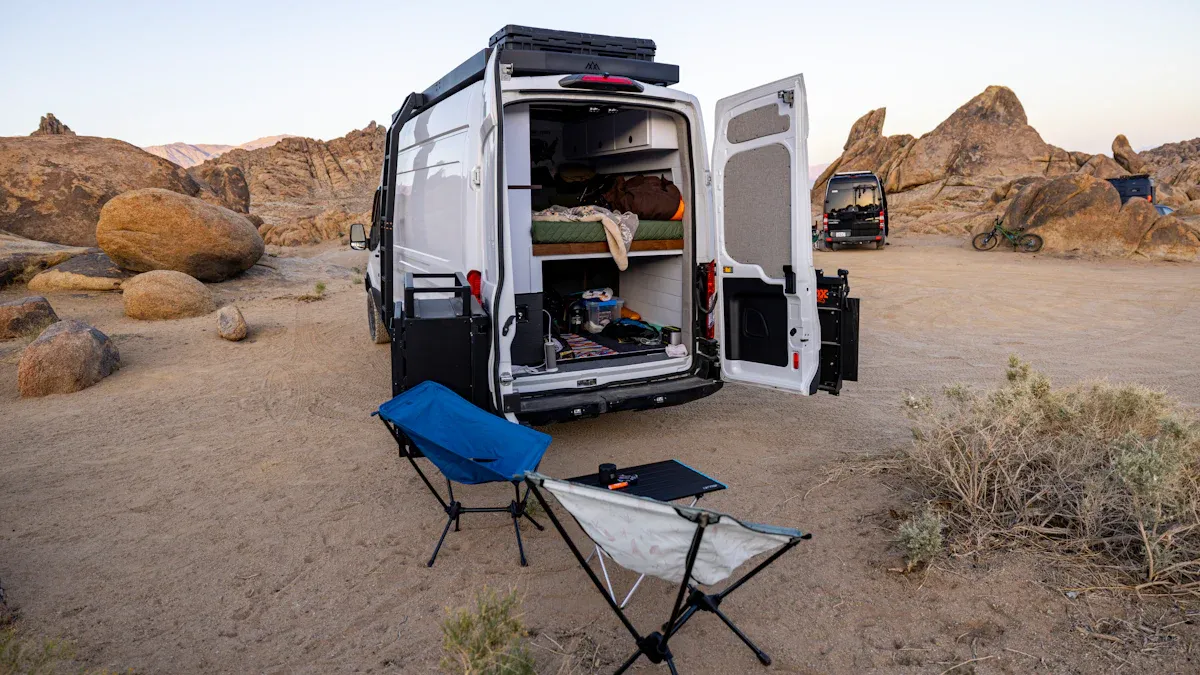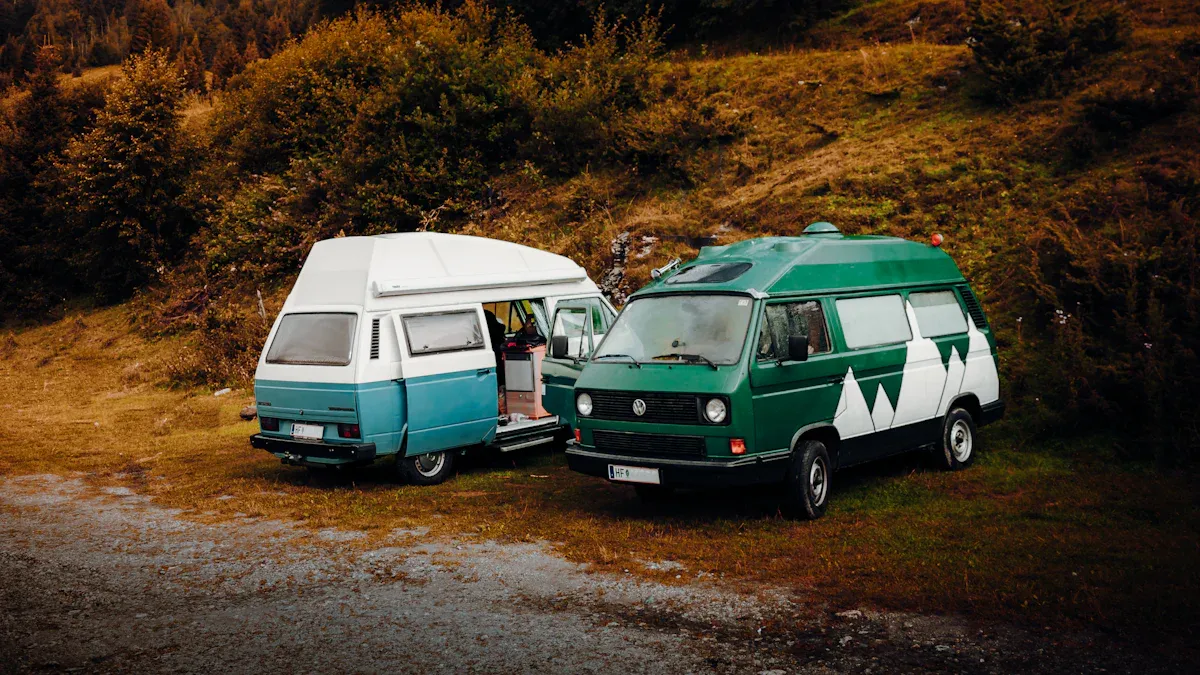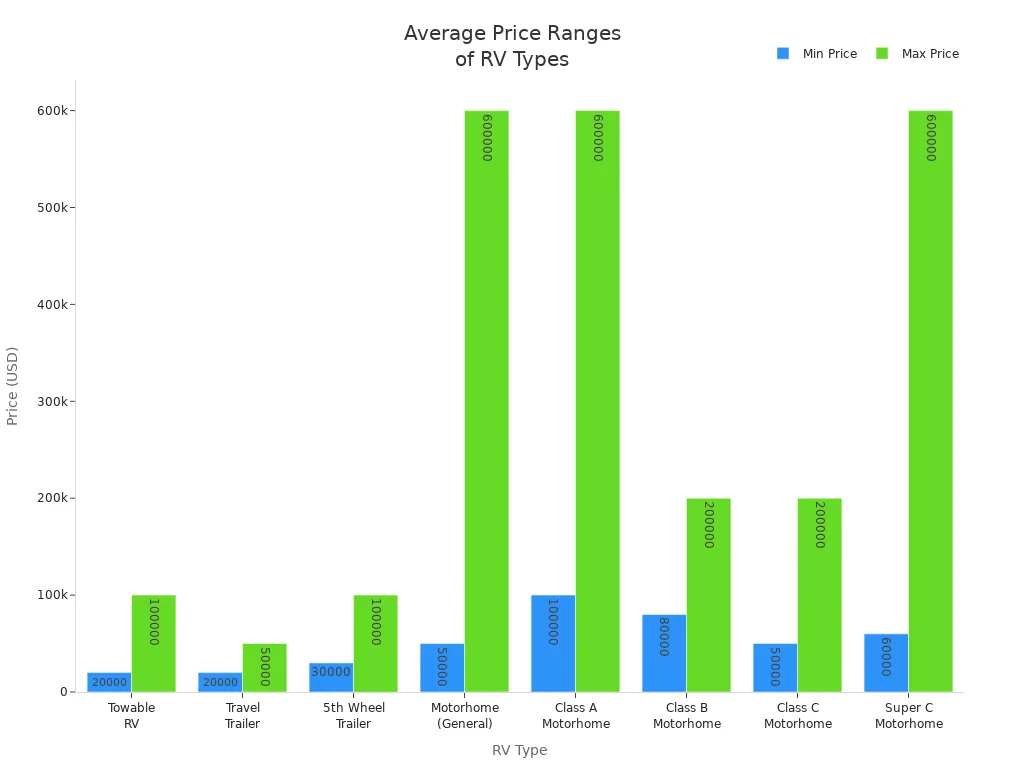RV means Recreational Vehicle. When you pick an RV, you join about 11.2 million U.S. families who have one. RVs can be motorized or towable, like a Camper Trailer or a caravan. Many people choose a recreational vehicle for camping because it lets you travel, sleep, and stay comfortable all at once. You can see nature, bring your family, and feel free on the road. More people are using recreational RVs now, especially younger travelers.
Statistic Description |
Value/Detail |
RV ownership in 2021 |
11.2 million households |
Americans planning RV trips (next 12 months) |
46 million |
Millennials and Gen Z RV owners |
22% currently |
RVs give you home-like comfort while you travel.
You can have flexible and independent trips.
The recreational lifestyle helps families bond and have fun outside.
RV means Recreational Vehicle. It includes vehicles you can drive or tow. These vehicles are made for short-term living and travel.Camper trailers are a type of towable RV. They are popular because they are comfortable and flexible. You can save money with them. You can tow them and leave them at campsites.Motorized RVs include Class A, B, and C motorhomes. These RVs let you drive and live in the same space. They usually cost more money. They also need more care.Picking the best RV depends on how you like to travel. It also depends on your budget. Think about how many people will go with you.You should check and take care of your RV often. This keeps your camper trailer or motorhome safe and fun for many trips.
Understanding the Meaning of RV in the Context of Camper Trailers

recreational vehicle definition
When you hear RV, you might picture a big motorhome or a small camper trailer. The Recreational Vehicle Industry Association says an RV is a vehicle made for temporary living. People use it for fun, camping, or during certain seasons. There are motorized and towable types, like travel trailers, fifth-wheel trailers, and camper trailers. These vehicles are not for living in forever. They give you a cozy place to stay while you enjoy being outside.
A camper trailer is a good example of this. It is a towable recreational vehicle for short-term living. You can hook a camper trailer to your car or truck and take it almost anywhere you want. Rules like NFPA 1192 and ANSI A119.5 help make sure camper trailers are safe and built well. You will also see other recreational vehicles, like caravans and teardrop trailers. These come in different sizes and have different features for your trips.
Tip: If you want comfort and freedom while rving, a camper trailer is a smart pick. It lets you go rv camping without needing a huge motorhome.
living quarters in rvs
Most RVs, like camper trailers and travel trailers, have important living spaces. These features make rving and camping much better. Here is a quick look at what you might find:
Feature |
Description |
Sleeping Areas |
Beds, bunks, or sofas that turn into beds for sleeping |
Kitchen Facilities |
Stove, sink, and fridge for making meals |
Bathroom Amenities |
Toilet, shower, and sink for easy cleaning |
Dining/Lounging |
Tables and seats for eating or relaxing |
Storage |
Spaces for your things and gear |
The layout and features can change based on the rv’s type and size. For example, a teardrop trailer is small and fits one or two people. A travel trailer or caravan can fit a whole family. Safety rules like CSA Z240 and NFPA 1192 make sure all living spaces in recreational vehicles are safe for fire, plumbing, and electricity. When you pick a camper trailer from ALLROAD, you get comfort, safety, and the chance to explore.
Different Types of RVs: Exploring Motorized and Towable Options Including Camper Trailers

motorized rvs
When you start rving, you will see motorized RVs. These RVs have engines, so you drive them like a car. Motorhomes come in three main types: Class A, Class B, and Class C. Each type has special features and fits different needs.
RV Class |
Description |
Size Range (feet) |
Sleeping Capacity |
Driveability / Towability |
Amenities Level |
Typical Cost Range |
Class A |
Large, bus-like motorhomes |
25-45 |
4-8 |
Driveable; may tow a small vehicle |
High-end, full-featured |
$60,000 – $500,000+ |
Class B |
Compact, van-based motorhomes |
16-24 |
2-4 |
Driveable; easiest to park |
Basic, compact |
$50,000 – $150,000+ |
Class C |
Mid-sized motorhomes with cab-over |
20-32 |
4-8 |
Driveable; moderate parking difficulty |
Moderate |
$50,000 – $150,000+ |
Class A motorhomes look like buses and feel fancy. They have big kitchens, king beds, and even washers. You can use a Class A for long trips or living full-time. Class B motorhomes are smaller and easy to park. They are good for couples or people traveling alone. Class C motorhomes have a bed over the cab and give you space and easy driving.
Motorhomes are special because you do not need to tow them. You get everything in one vehicle for rving and camping. Many families pick motorhomes for road trips and vacations. Motorhomes need care for both the vehicle and the RV parts, but they make travel easy and cozy.
camper trailer and towable rvs
Towable RVs give you another way to enjoy rving. These RVs do not have engines. You pull them with a car, SUV, or truck. Camper trailers, travel trailers, fifth wheels, and teardrop trailers are all towable. ALLROAD has many towable RVs, like camper trailers, caravans, truck campers, and teardrop trailers.
Category |
Description |
Subcategories / Classes |
Key Features / Classification Criteria |
Motorized RVs |
Self-powered vehicles with an engine, driven rather than towed |
Class A, Class B, Class C motorhomes |
Vary in size from large bus-like (Class A) to compact van-like (Class B), with Class C as mid-sized; differ in amenities, drivability, and sleeping capacity. |
Towable RVs |
Non-motorized units designed to be towed by a vehicle |
Travel trailers, Fifth wheels, Pop-up campers, Truck campers |
Range from lightweight pop-ups to large fifth wheels; classified by size, towing requirements, and amenities; generally more affordable than motorized RVs. |
Travel trailers are the most common towable RVs. They come in many sizes, from tiny to big family models. Fifth wheels are bigger and need a special hitch in a pickup truck. These RVs have lots of space and fancy features. With fifth wheels and travel trailers, you can leave your RV and use your car for short trips.
Camper trailers are great for flexible camping. They are simple to tow and set up. Many camper trailers have kitchens, beds, and storage. Teardrop trailers are small and light, good for quick trips. Truck campers fit in the back of a pickup and let you camp almost anywhere.
Note: Towable RVs, like travel trailers and fifth wheels, are getting more popular. They cost less and can be used in many ways. Travel trailers are the top choice, but fifth wheels are catching up because of their space and comfort.

ALLROAD makes many kinds of rvs and classes. You can pick camper trailers, caravans, truck campers, or teardrop trailers. Each one is made for comfort, safety, and fun. When you look at rv types, you will find one that fits your trips and your budget.
camper trailer vs other rvs
camper trailer features
You may wonder where camper trailers fit in the rv world. Camper trailers are the most popular towable rv type. Many families and new owners like them for their comfort and flexibility. When you choose a camper trailer, you get a small home you can pull with your SUV or truck. You can leave your trailer at the campsite. Then you use your car for short trips. This gives you more freedom when camping.
Most camper trailers have these features:
Sleeping space for two to eight people, good for couples or families.
A kitchen with a stove, sink, and fridge.
Bathroom with a toilet and shower.
Storage for your gear and personal things.
Insulation, heating, and cooling for all seasons.
Power supply, water tanks, and safety gear.
Extras like awnings and outdoor lights.
ALLROAD camper trailers are safe and strong. They are easy to set up and come in many sizes. Many people think camper trailers are the best for flexible travel and saving money.
Tip: Camper trailers are great for young families and first-time rv owners. They are simple to tow, quick to set up, and work well for trips to parks and campgrounds.
differences from motorhomes
There are big differences between camper trailers and motorhomes. Motorhomes have engines built in. You drive them like a big van or bus. In a motorhome, you can use the kitchen or bathroom while moving. This is helpful for long trips, especially for families.
Here is a table to compare camper trailers, motorhomes, and fifth wheels:
RV Type |
Engine |
Setup & Use |
Living Space & Features |
Mobility & Convenience |
Cost & Insurance |
Camper Trailer |
No engine |
Tow with vehicle; quick setup |
Sleeping, kitchen, bathroom, storage |
Detach at campsite; use vehicle separately |
Lower purchase and insurance costs |
Motor Home |
Built-in |
Driveable; fast setup |
Full kitchen, bathroom, bedrooms, entertainment |
Use amenities while driving; all-in-one |
Higher purchase and insurance costs |
Fifth Wheels |
No engine |
Tow with heavy-duty truck; more setup |
Large living space, dedicated bedroom |
Stable towing; truck use limited |
Higher cost; needs 5th wheel hitch |
Motorhomes are comfy on the road, but they cost more to buy and insure. Camper trailers give you more freedom and cost less. You need to know how to tow, but you save money and can use your car for exploring. Fifth wheels are bigger, but you need a strong truck and a special hitch.
Many people think camper trailers and travel trailers are cheaper and easier to use. You can go camping without spending a lot on a motorhome. If you want something light, ALLROAD also has teardrop trailers and truck campers.
Note: If you want comfort, freedom, and a good price, camper trailers are the best choice for many families and people who love the outdoors.
You now know RV means Recreational Vehicle. This name includes many kinds of vehicles. Some are camper trailers, and some are motorhomes. Here is a simple chart with the main types:
Type |
Category |
Typical Length |
Description |
Camper trailer |
Trailer |
13–35 ft |
Pulled by a car or truck for easy camping |
Fifth wheel |
Trailer |
17–40 ft |
Needs a special hitch in a pickup truck |
Class A motorhome |
Motorhome |
26–45 ft |
Big and fancy, made for long trips |
Class B motorhome |
Motorhome |
17–23 ft |
Small van, simple to drive |
Class C motorhome |
Motorhome |
20–30 ft |
Medium size, has a bed over the cab |
Truck camper |
Insert |
8 ft or more |
Sits in the back of a pickup truck |
When you pick an RV, think about how you like to camp. Also, think about how many people will go and how much money you want to spend. The rv lifestyle lets you travel with comfort and freedom. If you have questions or want to tell your story, leave a comment below!
FAQ
What is the main difference between a camper trailer and a caravan?
You tow both camper trailers and caravans behind a vehicle. Camper trailers usually have a simpler design and lighter weight. Caravans often offer more space and extra features. Both give you comfort while traveling.
Can you use a camper trailer for year-round camping?
You can use a camper trailer in different seasons. Many models have insulation and heating. Always check the weather and prepare your trailer for cold or hot conditions. This helps you stay safe and comfortable during your camping trips.
What should a new RVer know before buying a camper trailer?
You should check the weight of the camper trailer and make sure your car can tow it. Look at the features you need, like sleeping space or a kitchen. Visit the ALLROAD website to compare options like teardrop trailers and caravans.
How do you maintain a camper trailer for long trips?
You should inspect tires, brakes, and lights before each trip. Clean the inside and outside after camping. Check water tanks and electrical systems. Regular care helps your camper trailer last longer and keeps you safe on the road.























